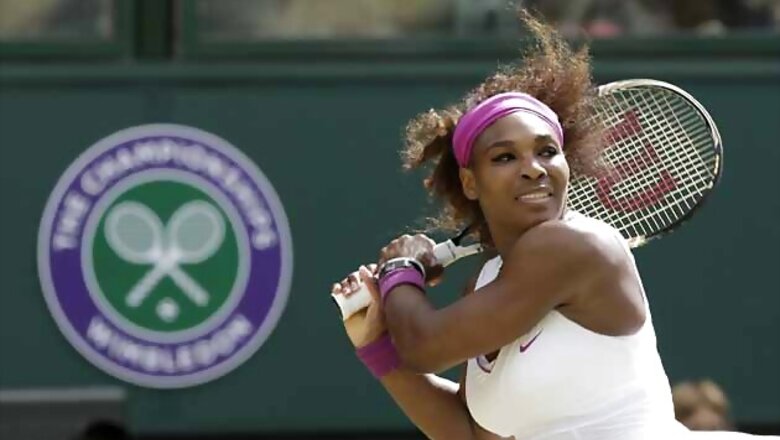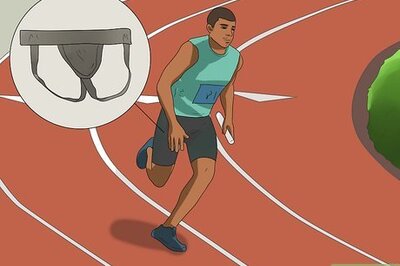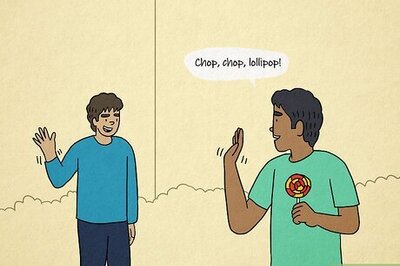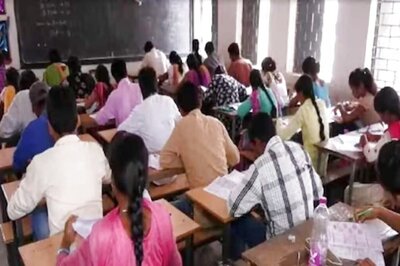
views
London: More than once during the past fortnight, Serena Williams has won an important point at Wimbledon and then returned to the baseline, her clenched fist leading the way.
The ferocity of the gesture is understandable, given the obstacles she has beaten back in the past couple of years.
A succession of health issues led to a long layoff that forced Williams to mount a career comeback, and she'll try to cap it on Saturday when she plays Agnieszka Radwanska, the first Polish player to reach a Grand Slam final since 1939.
Williams seeks her 14th major title, and would tie her sister Venus with a fifth win at Wimbledon.
"I'm so happy to be playing," she said. "I've been through so much in the past year or two years, it has been unbelievable."
This week Radwanska has been ailing herself, battling an upper respiratory illness that makes it difficult to speak and forced her to cancel a news conference on Friday.
"I will do whatever it takes to make sure I'm ready to play the best I can," she said in a statement.
While the No. 3-ranked Radwanska seeks to become Poland's first Grand Slam title, the No. 6-ranked Williams has a shot at her first major championship since Wimbledon in 2010. Shortly after that victory, she cut her feet on glass at a restaurant, required two operations and spent more time in the hospital because of blood clots in her lung and a gathering of blood under the skin of her stomach.
"I really thought Serena was going to die," said her father and coach, Richard Williams. "This is the most important tournament that Serena would ever win ... because Serena didn't think she'd ever play tennis again. She told me so."
She was sidelined nearly a year before rejoining the tour in June 2011, and her ranking sank to 175th. "I just wanted to make it through everything that I was going through and become a survivor," she said.
The comeback proceeded in fits and starts. She lost in the fourth round last year at Wimbledon, and reached the final of the US Open before losing to Samantha Stosur.
She was beaten in the fourth round at this year's Australian Open, and then came her stunning defeat in May against 111th-ranked Virginie Razzano in the first round at the French Open. It's the only time in 48 career Grand Slam appearances that Williams lost her opening match.
With older sister Venus' fortunes in decline as she deals with an autoimmune disease, some speculated the family might never win another major title.
Now, with one more victory, Wimbledon will again become the Williams Open. Serena, Venus or both have reached the final in 11 of the past 13 tournaments. They've combined to win nine titles at the All England Club, and the sisters will try for their fifth Wimbledon doubles title on Saturday.
While Serena's a familiar finalist, her perspective these days is different. "I have so much appreciation for every moment on the court," she said. "I really take pride in playing, especially playing such big, amazing tournaments like this. I just want to do the absolute best that I can at all moments."
After scares in the third and fourth rounds, Williams has lately been close to her absolute best. She eliminated defending champion Petra Kvitova in the quarter-finals, then defeated reigning Australian Open champion Victoria Azarenka on Thursday, winning both times in straight sets.
"It's a different Serena we see now," said 18-time Grand Slam champion Chris Evert, an analyst for ESPN. "We haven't seen Serena play as well as she has these last two matches since before she hurt her foot. She has great power and movement, and the confidence she needs to go with that."
As has often been the case with Williams, her play in the tournament improved as the opposition became more formidable. She beat Zheng Jie in the third round, winning the third set 9-7, then edged wild card Yaroslava Shvedova, taking the third set 7-5.
She's a big favorite against Radwanska. "Serena's playing amazing tennis at the moment," Radwanska said. "I don't really have much to lose, so I'm going to try my best and we'll see."
Radwanska is a steady, dogged baseliner who likes grass — she was a Wimbledon junior champion in 2005. With a win in the final, she would rise for the first time to No. 1 in the rankings.
But she lacks the weapons of Williams, whose big serve is especially well-suited to Wimbledon's speedy grass courts. "The championship is Serena's to win or lose," Evert said. "She controls every point with her power."
Williams hit a tournament-record 23 aces against Zheng, then had 24 against Azarenka. With 85 aces in the tournament, she's four shy of the Wimbledon record she set in 2010.
During one stretch in her semi-final victory, Williams won 17 consecutive service points. No wonder she rates her serve as the shot she finds the most fun.
"It's the most reliable, like, OK, yes, you don't have to think, don't have to do anything, just hit an ace," she said with a smile. "It's like a lazy shot."
When she wins, Williams has taken to hopping on the grass like a grade-schooler at recess. But she's no youngster anymore. At 30, she could become the first thirty-something woman to win a major tournament since Martina Navratilova, who was 33 when she won Wimbledon in 1990.
Not that Williams feels like an old-timer. "No," she said. "Mentally, I'm 12."
She feels more like a comeback kid.

















Comments
0 comment